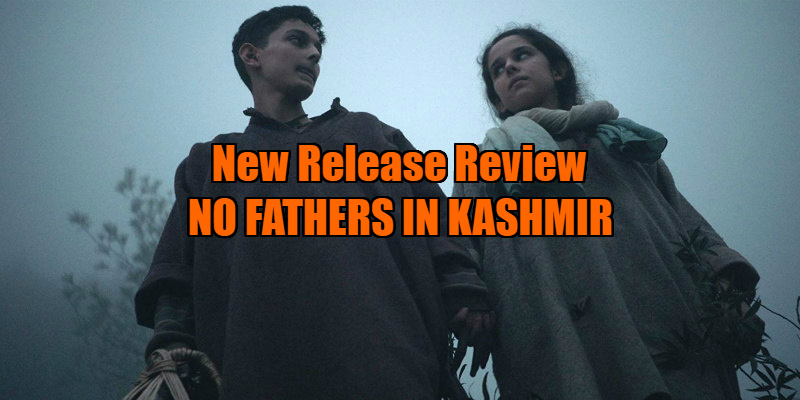
Review by Benjamin Poole
Directed by: Ashvin Kumar
Starring: Zara La Peta Webb, Nathasha Mago, Majid-Shivam Raina, Kulbhushan Kharbanda, Soni Razdan, Ashvin Kumar, Anshuman Jha

Indie veteran Ashvin Kumar’s No Fathers in Kashmir is everything which is to be cherished about independent cinema. A drama which essays the Kashmiri situation through the eyes of a western teen girl, the film is part travelogue, mainly coming of age drama, and ultimately a polemic about a real-life aspect of global conflict; the sort of narrative superabundance that only comes from a personal point of view, from a product which has so much to say, along with such sincere passion, that it cannot help but to indulge its various concepts and plot threads (even if, as is the case here, this vigour results in something of an imbalance). And, while we’re waving the indie flag, from the concept of my spoilt, safe and sensationally ignorant existence, No Fathers in Kashmir not only entertains, but informs me (and, I’m sure, due to the lack of coverage of the situation in western media - there are scattered articles on BBC news, but you do have to look - other members of the audience, as well) of the socio-political situation in the territory; an area which is aggressively contested by India, Pakistan and China, making it one of the most militarised zones in the entire world.


Despite the imagery of the film’s first act, which is given over to surely some of the most beautiful locations ever committed to cinema (those mountains, the aquatic conurbations; all monitored by glum men in fatigues), Kashmir is not quite an ideal holiday destination, then. However, widowed mum Zainab (Natasha Mago) is obliged to make the journey in order for her in-laws to sign the death certificate of her ex-husband, a man who has been disappeared within the region. Her husband, and the father of Noor, our teen protagonist (Zara La Peta Webb - fucking tremendous), exists within a heart-breaking limbo: no body exists, and given that many men are taken as POWs, hope therefore exists that the man may be alive. Zainab though, living in Britain, needs to move on and thus makes her pilgrimage with Noor in tow.

Noor is a modern teenager, which, of course, entails a vain compulsion to broadcast the minutiae of her existence via social media. This is fine when it’s the dramatic panoramas of the Pir Panjal range, not so much when she dresses up her new-found Kashmiri mate (Majid-Shivam Raina, also superb) in fatigues and a rifle and takes a picture of him for the lols and the likes. Their problems deepen when, foolheartedly investigating the disappearance of Noor’s dad, the two stumble upon a prison-come-torture chamber, a misadventure which ends up with both children captured. It’s unlikely, of course, that Western Noor is affiliated with secessionism, but there is that posted picture of Majid as a militant, and, further to that, whatever other digital images abide on Noor’s phone (in Kashmir, text message services are regularly blocked, and the internet is conveniently sporadic).

There is a lot going on in No Fathers in Kashmir, and resultantly, the most important and exciting narrative development (Majid’s imprisonment) is perhaps not given the full scope it deserves (I would have preferred more on the Majid development than the weirdly inconsequential bits with the mad lad who sneaks into Noor’s mosque in the film’s opening, for instance). However, the energy with which the film is produced, the visual flourishes and the performances, offset so-so structural issues of No Fathers in Kashmir. There is one sequence where, likes two kids in a fairytale, Majid and Noor are lost and alone in a night-time forest; the camera pulls back and back, floating away to reveal and further reveal the vast cosmic horror of the mountainous terrain, and how tiny and insignificant our heroes are within it. Raina and La Peta Webb are incredible in this sequence, and throughout the entirety of the film, too. In perhaps cinema’s most boring season, when everyone is wanging on about awards, its demonstrative how little such trinkets matter when performances like these don’t even seem to reach the tastemakers. Such an injustice mirrors the similarly inconspicuous cultural profile of the Kashmir situation itself, an inequality that No Fathers in Kashmir goes some way towards addressing.

No Fathers in Kashmir is in UK cinemas January 24th.
"Like a vampire itself, the myth continues to feed on the lifeblood of popular culture in order to attain immortality."@renzelen looks at how the latest DRACULA adaptation fits in with Bram Stoker's undying lorehttps://t.co/IDPFrUMhcx pic.twitter.com/StwNx4gPMk— 𝕋𝕙𝕖𝕄𝕠𝕧𝕚𝕖𝕎𝕒𝕗𝕗𝕝𝕖𝕣.𝕔𝕠𝕞 🎬 (@themoviewaffler) January 12, 2020

